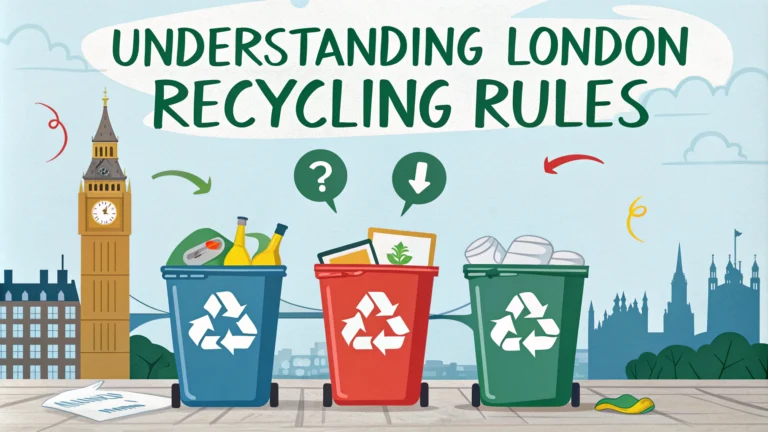London’s recycling system helps reduce waste and protect the environment while following specific guidelines that vary by borough.
Each London borough manages its own recycling program, leading to different rules and collection schedules across the city.
Understanding your local recycling requirements is essential for proper waste management and avoiding potential fines.
Finding Your Local Recycling Rules
Enter your postcode on the UK government’s recycling collection finder to see specific guidelines for your area.
- Contact your local council directly
- Check your borough’s official website
- Download your area’s waste collection app if available
Common Recyclable Items in London
| Material | What’s Accepted |
|---|---|
| Paper & Cardboard | Newspapers, magazines, boxes (flattened) |
| Glass | Bottles and jars (rinsed) |
| Plastic | Bottles, containers marked with recycling symbols 1-5 |
| Metal | Tins, cans, aluminum foil (clean) |
Items That Cannot Be Recycled
- Plastic bags and soft plastics (take to supermarket collection points)
- Food-contaminated packaging
- Disposable coffee cups
- Bubble wrap
- Electronics (require special disposal)
Recycling Collection Schedule
Most London boroughs operate bi-weekly recycling collections, alternating with general waste pickup.
- Place bins out by 6am on collection day
- Ensure recyclables are clean and dry
- Sort items according to local guidelines
- Keep recycling separate from general waste
Special Recycling Services
- Bulky Items: Book special collections through your council
- Electronics: Use designated e-waste recycling points
- Batteries: Return to supermarket collection points
- Garden Waste: Subscribe to green waste collection service
Tips for Better Recycling
- Rinse containers before recycling
- Remove packaging tape from cardboard
- Flatten boxes to save space
- Check plastic numbers before recycling
- Keep a recycling guide on your fridge
Moving Home Recycling Checklist
- Contact new borough for collection calendar
- Request recycling bins if needed
- Update collection service addresses
- Review new area’s specific guidelines
- Dispose of non-recyclables before moving
Making Recycling Part of Your Routine
Set up separate bins in your home for different recyclable materials to make sorting easier.
Download your borough’s waste management app for collection reminders and updates.
Consider joining local environmental groups to stay informed about recycling initiatives and changes to local policies.
Recycling Reports and Statistics
London aims to reach a 65% recycling rate by 2030, with current rates varying significantly between boroughs.
- Top performing boroughs achieve over 50% recycling rates
- Inner London typically has lower rates than outer boroughs
- Contamination rates impact overall recycling effectiveness
Community Recycling Initiatives
- Local recycling champions programs
- Community composting schemes
- Neighborhood cleanup events
- Educational workshops in schools
Business Participation
Many London businesses participate in commercial recycling programs, often sharing facilities and collection services to improve efficiency.
Seasonal Recycling Considerations
- Christmas tree collection points in January
- Additional collections during peak periods
- Garden waste services during growing season
- Special events for hard-to-recycle items
Building a Sustainable London Together
Effective recycling requires cooperation between residents, councils, and waste management services. Each household’s contribution helps reduce landfill waste and supports London’s environmental goals.
- Stay informed about local recycling policies
- Educate family members and neighbors
- Report issues to your council promptly
- Support local environmental initiatives
Together, Londoners can create a more sustainable city through proper recycling practices and waste reduction efforts.
FAQs
- What are the main recycling bins used in London?
The main recycling bins in London include: a blue bin/box for paper and cardboard, a green bin for garden waste, a black/grey bin for general waste, and usually a separate container for mixed recycling (glass, plastics, and metals). - What items are NOT recyclable in London?
Food waste, plastic bags, bubble wrap, Styrofoam, broken glass, tissues, paper towels, food-contaminated packaging, and crisp packets cannot be recycled in standard London recycling bins. - Do I need to wash recyclables before putting them in the bin?
Yes, all recyclable items should be rinsed clean of food residue and be dry before placing them in recycling bins to prevent contamination. - When should I put my bins out for collection?
Bins should be placed outside by 6:00 AM on your designated collection day. Collection schedules vary by borough, so check your local council’s website for specific times. - How do I dispose of large items when moving?
Contact your local council to arrange a bulky waste collection, use a licensed waste carrier, or take items to a local recycling center. Some councils offer free collections for certain items. - What should I do with my bins when moving house?
Leave your bins at the property as they belong to the council, not the resident. Notify your council about your move to ensure proper service transfer. - Where can I find my local recycling center in London?
Visit the Recycle for London website or your local council’s website to find your nearest recycling center. Most London boroughs have multiple recycling points. - How do I report missed recycling collections?
Report missed collections through your local council’s website or app within 24 hours of your scheduled collection day. - What happens if I put items in the wrong recycling bin?
Incorrectly sorted items can contaminate entire loads of recycling. Your bin may not be collected, and you might receive a warning notice from the council. - Can I recycle electronics and batteries in regular bins?
No, electronics and batteries must be taken to specific recycling points or electronic stores. Many supermarkets have battery recycling bins.







